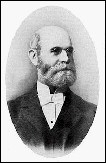#296
Lord, I'm Coming Home
Words and music by William
J. Kirkpatrick, 1902 (1838-1921)
I致e wandered far away from God,
Now I知 coming home;
The paths of sin too long I致e trod,
Lord, I知 coming home.
Refrain:
Coming home, coming home,
Nevermore to roam;
Open wide Thine arms of love,
Lord, I知 coming home.
I致e wasted many precious years,
Now I知 coming home;
I now repent with bitter tears,
Lord, I知 coming home.
Refrain:
Coming home, coming home,
Nevermore to roam;
Open wide Thine arms of love,
Lord, I知 coming home.
I知 tired of sin and straying, Lord,
Now I知 coming home;
I値l trust Thy love, believe Thy word,
Lord, I知 coming home.
Refrain:
Coming home, coming home,
Nevermore to roam;
Open wide Thine arms of love,
Lord, I知 coming home.
My only hope, my only plea,
Now I知 coming home;
That Jesus died, and died for me,
Lord, I知 coming home.
Refrain:
Coming home, coming home,
Nevermore to roam;
Open wide Thine arms of love,
Lord, I知 coming home.
I need His cleansing blood I know,
Now I知 coming home;
Oh, wash me whiter than the snow,
Lord, I知 coming home.
Refrain:
Coming home, coming home,
Nevermore to roam;
Open wide Thine arms of love,
Lord, I知 coming home.
 Written
by William James Kirkpatrick in 1892 because he had a burden for a young man's
soul. He thought of the prodigal son who said, "I will arise and go to
my father, and will say unto him, 'Father, I have sinned against heaven, and
before thee'." (Luke 15:18) While Kirkpatrick was in prayer, the words
of the refrain formed in his mind. Concluding his prayer, he wrote down the
words, and then the five stanzas following in quick succession He soon composed
a suitable tune and believed that this song was God's answer to his prayer for
his young friend. The song did reach the heart of the young man and he gave
his life to God.
Written
by William James Kirkpatrick in 1892 because he had a burden for a young man's
soul. He thought of the prodigal son who said, "I will arise and go to
my father, and will say unto him, 'Father, I have sinned against heaven, and
before thee'." (Luke 15:18) While Kirkpatrick was in prayer, the words
of the refrain formed in his mind. Concluding his prayer, he wrote down the
words, and then the five stanzas following in quick succession He soon composed
a suitable tune and believed that this song was God's answer to his prayer for
his young friend. The song did reach the heart of the young man and he gave
his life to God.
Son of a school teacher and musician, Kirkpatrick grew
up in a musical atmosphere. In 1854, he went to Philadelphia, Pennsylvania,
to study music and learn a trade; he spent over three years as a carpenter.
But he was more interested in music than mechanics, devoting all his leisure
time to its study. His ambition at the time was to become a violinist. In 1855,
Kirkpatrick joined the Wharton Street Methodist Episcopal Church in Philadelphia,
and from then on devoted himself mostly to sacred music, giving his services
to the choir and Sunday school. As there were few church organs in that day,
his violin and cello were in constant demand for choir rehearsals, singing societies,
and church programs. During this time he wrote a number of unpublished hymn
tunes and anthems. Kirkpatrick studied vocal music under Professor T. Bishop,
then a leading oratorio and ballad singer. He became a member of the Harmonia
and Handel and Haydn Sacred Music Societies, where he heard the greatest singers
of the day and became familiar with the principal choral works of the great
composers. Kirkpatrick痴 first published composition was When the Spark of Life
Is Waning, which appeared around 1858 in the Musical Pioneer in New York. He
went on to publish about 50 hymn collections, many in collaboration with John
Sweney.
 Written
by William James Kirkpatrick in 1892 because he had a burden for a young man's
soul. He thought of the prodigal son who said, "I will arise and go to
my father, and will say unto him, 'Father, I have sinned against heaven, and
before thee'." (Luke 15:18) While Kirkpatrick was in prayer, the words
of the refrain formed in his mind. Concluding his prayer, he wrote down the
words, and then the five stanzas following in quick succession He soon composed
a suitable tune and believed that this song was God's answer to his prayer for
his young friend. The song did reach the heart of the young man and he gave
his life to God.
Written
by William James Kirkpatrick in 1892 because he had a burden for a young man's
soul. He thought of the prodigal son who said, "I will arise and go to
my father, and will say unto him, 'Father, I have sinned against heaven, and
before thee'." (Luke 15:18) While Kirkpatrick was in prayer, the words
of the refrain formed in his mind. Concluding his prayer, he wrote down the
words, and then the five stanzas following in quick succession He soon composed
a suitable tune and believed that this song was God's answer to his prayer for
his young friend. The song did reach the heart of the young man and he gave
his life to God.